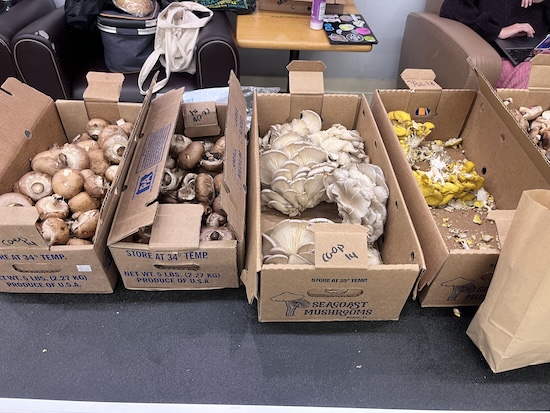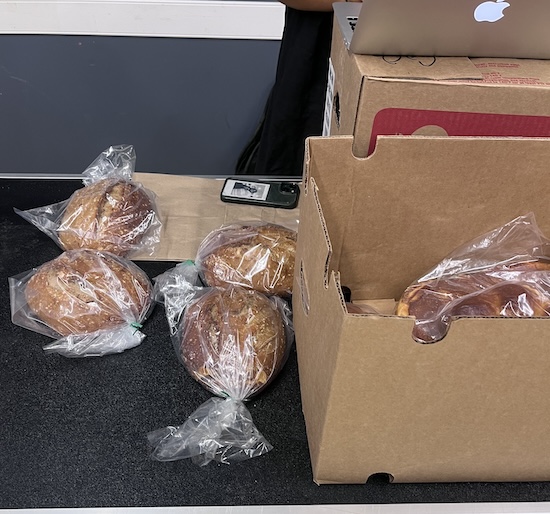
c/o Eden Richman
The Daniel Family Commons (DFC) was buzzing with activity for the Wesleyan Local Food Cooperative’s (Co-op) semi-annual “Swipe Night” on Wednesday, Sept. 25 at 7 p.m. Chappell Roan boomed from a speaker as students approached a long table filled with Co-op volunteers who checked their laptops for information on what shares had been purchased and wrote prices on brightly colored sticky notes. The students then filed into a long line towards the corner of the room, where a Bon Appétit employee sat with an ID swipe machine.
The Wesleyan Local Food Cooperative, an entirely student-run organization, partners with nearby sustainable farmers to bring local produce to University students. Customers buy shares and then pick up products every week for nine weeks each semester.
“This is the biggest year since I took over the program three years ago,” Co-op Financial and Operations Manager Cate Goodwin-Pierce ’25 said.
This semester, the program boasts 477 student customers and nearly $73,000 in sales of bread, cheese, coffee, eggs, kombucha, meat, mushrooms, and produce. Shares range in cost from 114 meal plan points ($114) for five to seven pounds of produce to 35 points ($35) for six eggs each week. Students can split the cost of shares with up to six people.
“We’re a non-profit organization,” Goodwin-Pierce said. “Any money we make gets reinvested into sustainable agriculture. We take no cuts.”
Recently, Co-op has been facing new challenges, as the University imposed new restrictions on their operations. In Fall 2023, the University imposed its first cap on the program’s profits.
“The school capped us at $75,000, so if we exceed that, we owe the school that much money,” Goodwin-Pierce said. “The official reason they provided [for capping profits] was that it was too much money for students to handle. The real answer is that Wesleyan has a contract with Bon Appétit that guarantees them a certain amount of money.”
According to Goodwin-Pierce and Co-op’s extensive records, in pre-pandemic years the program made over $100,000 each semester.
“Since we have a budget cap, we can’t expand out,” Goodwin-Pierce said. “For some of our farmers, we are their biggest supplier. Without our investment, they can’t do sustainable agriculture.”
Director of Auxiliary Services Michelle Myers-Brown, who oversees campus dining, provided further insight into those profit limits.
“In the fall of 2015 the cap per semester was raised from $60,000 to $75,000 per semester and has remained at that level since the co-op has not exceeded that amount since that time,” Myers-Brown wrote in an email to The Argus. “They have also eliminated some of the sub groups (meat for example which tended to be the most expensive shares).”
Then, in Spring 2024, Bon Appétit mandated that all of Co-op’s vendors must be approved through their Farm to Fork program.
“It was so much bureaucracy,” Goodwin-Pierce said. “It took an extra four weeks.”
She explained that implementing the program was a redundant process from a sustainability perspective.
“Their regulations are far less rigorous than ours,” Goodwin-Pierce said. “[In] Farm to Fork, massive monoculture farms like Ocean Spray [also qualify, although they] are not actually sustainable.”
Co-op’s criteria for farmers to join their program requires that farmers are located 45 minutes or less from campus, use sustainable farming practices, are run by members of the local community, and use organic systems, even if they don’t have the official organic certification.
Bon Appétit’s sustainability regulations, however, have far less stringent requirements for what qualifies as local. Small and medium farms can be located as far as 150 miles from campus, and large farms can be as far as 500 miles away. Additionally, farms qualify as small as long as they make less than $5 million annually.
In the most recent administrative change, less than 24 hours before the Sept. 25 Swipe Night, Bon Appétit reversed a long-standing Co-op policy that allowed students to swipe other students’ WesIDs if they could not be physically present during the three and a half-hour Swipe Night window.
“NO, YOU PERSONALLY DON’T HAVE TO BE THERE BUT SOMEONE WITH YOUR ID MUST BE,” read an email sent out to customers on Sunday Sept. 22, three days before the event.

c/o Eden Richman
However, according to Goodwin-Pierce, Myers-Brown mandated that the statement be rescinded. It had always been University policy, Myers-Brown conveyed in an email, that every student must swipe their own ID.
“With regard to the ID swipes and the ‘short notice’…no one is ever allowed to use another student’s ID to swipe and that practice, if used in the past for co-op purchases, is a violation of the WesID policies,” Myers-Brown wrote to The Argus. “Unfortunately, the Local Co-op had never been transparent with us and we didn’t know they were allowing students to use other cards to pay for all shares. It was only when their advisor put out a message that point blank stated [that students could swipe other’s IDs] that we became aware they were allowing that to happen. As soon as I received a copy of the advertisement I reached out to their advisor who notified the group. The timing was simply based on when they advertised and it was brought to me as a problem.”
For Co-op volunteers, this represented yet another limitation in a long line of strained negotiations.
“There is no spirit of collaborating in good faith,” Goodwin-Pierce said. “They make us out to seem like we’re disorganized and can’t handle it. Post-Covid there [has] been a new wave of restrictions, and they act like it has always been the case.”
The biggest restriction on the program is a policy that has been in place since its conception in 2011. Bon Appétit takes 20% of the program’s profits for the use of the WesID swiper for Swipe Night, and for the intermittent use of their loading docks in the basement of Usdan.
“This night is costing $14,000,” Goodwin-Pierce said. “Food prices in general have gone up since the pandemic, and now we have to bump up our prices by 20% because we are not willing to pay our farmers less.”
Samia Segal ’25, another volunteer at Swipe Night last week, has been working for the Co-op since her sophomore fall. Segal discussed the bureaucratic issues and changes imposed over that time.
“As a college student, it’s hard to balance figuring out finances and feeding oneself,” Segal said.
She compared the Co-op cost of eggs to that of Weshop, where a carton of 12 eggs can cost as much as $8.00.
“The price of our eggs is significantly less than Weshop, so it is a better bang for your buck,” Segal said. “If prices were as low as they used to be, [it would be] a no-brainer compared with Weshop. And now, people are less likely to support local agriculture.”
Weshop is also owned by Bon Appétit, setting the standard for grocery prices on campus.
“They have a monopoly on food service at [this] school,” Segal said. “They have cornered students into a place where the only ones benefiting are Bon Appétit.”
Still, Myers-Brown maintains that the University’s agreement with the Co-op has been clear and settled from the start.
“There are no increased limitations,” Myers-Brown wrote to The Argus. “Ten years ago the Local Co-op, WSA Student Life Committee, Bon Appetit, Dean of Students Office, Finance and City of Middletown Health Department reevaluated the organization and their mission and agreed that the following would be the [operating] standards for the group: All vendors needed to maintain an agreement with Wesleyan which included hold harmless statement; agreements would not be needed from vendors already used by Bon Appetit; All Vendors must be on Compass group approved purchase list to insure FDA and other food quality assurance; All orders would be placed to approved vendors by Bon Appetit (BA) in conjunction with BA orders to garner best fees possible; Funds collected from sales will be transferred to Bon Appetit for payment to vendors; Delivery will be accepted at loading dock and set aside by BA handler; moved to Usdan B25 for distribution on scheduled Wednesdays.”
Nevertheless, day-to-day operations for Goodwin-Pierce, Segal, and the rest of the Co-op volunteers feel heavier than ever. They’re not alone in this struggle: other food services on campus have been juggling negotiations on profits and points caps for the last few years.
“Espwesso, Long Lane [Farm], Star & Crescent, they’re all dealing with it,” Goodwin-Pierce said. “If it has to do with food and interrupting the monopoly on campus, Bon Appétit is involved.”
Eden Richman can be reached at erichman@wesleyan.edu.